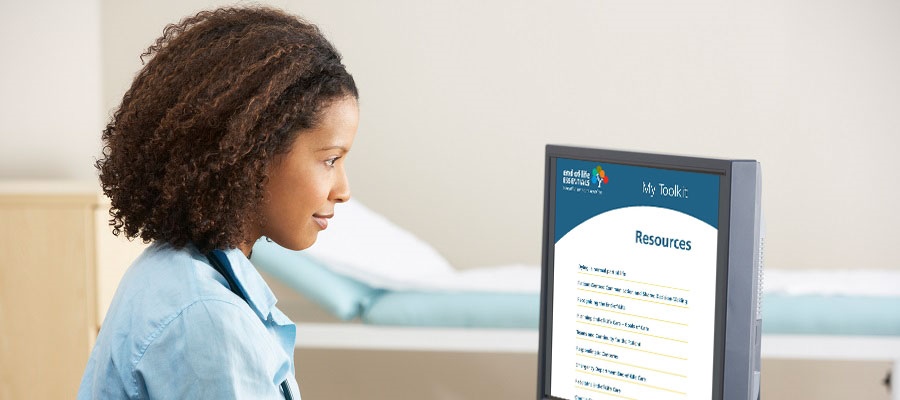How a practice change toolkit can improve end of life care in hospitals
1797 0
A blog post written by Deb Rawlings, Co-Investigator and Jane Durbridge, Marketing and Communications Coordinator, End-of-Life Essentials

One Australian will die every 2 minutes and 19 seconds [1] and of these deaths, 52% will die in acute hospitals. It is estimated that 50% of these deaths are expected [2] and in line with an ageing population, these deaths are projected to increase.
In acute hospitals, clinicians report that it is often easier to continue treatments than to talk with patients and families about the end of life. [3] Fear, denial and unrealistic expectations by clinicians can lead to a cascade of invasive treatments or referrals that result in poor end-of-life care. [3] As a result, care at the end of life can be provided by strangers in critical circumstances without patients expressing what matters most to them.
The End of Life Essentials (EOLE) project is based on the Australian Commission on Safety and Quality in Health Care’s National Consensus statement on Essential Elements for safe and high-quality end-of-life care and aims to increase knowledge and skills in end-of-life care for doctors, nurses and allied health professionals in acute hospitals. Health professionals are encouraged to use them with free peer-reviewed education and resources and to consider how they can improve their practice. [4] Implementation of evidence-based practice, however, is not without its challenges. Barriers such as the volume of evidence to read, the time required to appraise it, and a lack of knowledge/skill in applying it to practice [5] have been identified.
With this in mind, a free practice change toolkit, with action points intended to be an aid to learning has been developed, focusing on bringing about positive changes to workplace behaviours at the point of care.
Toolkits have been described as a Knowledge Translation strategy, [6] and here, comprise materials that might relate to practice change or behaviour change, with the aim of improving healthcare. There is a multitude of reasons why toolkits are implemented, sometimes in a specific disease context, or as in EOLE as part of a broader program. In healthcare, they can also be targeted at health professionals or patients. [7]
Toolkits have also been found to be a useful tool to facilitate evidence-based practice. [5] (2015). Evaluation is an important part of toolkit implementation, [8] and we have embedded this into EOLE at many points.
The EOLE modules cover the following topics:
- dying (a normal part of life)
- patient-centered communication and shared decision-making
- recognising the end of life
- goals of care
- teamwork
- responding to concerns
- emergency department end-of-life care
- imminent death (care of bodies, families, staff); and
- care of patients living with chronic complex conditions.
Currently, over 12,000 health professionals have registered to undertake EOLE education, and results from an evaluation of four education modules showed statistically significant improvement in learners’ knowledge, skill, attitude and confidence in providing end of life care.
The education and toolkit can be found at endoflifeessentials.com.au
References
- Australian Bureau of Statistics. Population Clock [Internet]. 2019 [updated 2019 Sep 19; cited 2019 Oct 10].
- Australian Commission on Safety and Quality in Health Care (ACSQHC). National Consensus Statement: essential elements for safe and high‑quality end-of-life care. Sydney: ACSQHC; 2015.
- Australian Commission on Safety and Quality in Health Care (ACSQHC). Safety and quality of end-of-life care in acute hospitals: a background paper. Sydney: ACSQHC; 2013.
- Rawlings D, Devery K, Poole N. Improving quality in hospital end-of-life care: honest communication, compassion and empathy. BMJ Open Quality. 2019;8:e000669. doi:10.1136/ bmjoq-2019-00066
- Glegg SMN, Livingstone R, Montgomery I. Facilitating interprofessional evidence-based practice in paediatric rehabilitation: development, implementation and evaluation of an online toolkit for health professionals. Disabil Rehabil. 2016;38(4):391-9. doi: 10.3109/09638288.2015.1041616. Epub 2015 Apr 29
- Barac R, Stein S, Bruce B, Barwick M. Scoping review of toolkits as a knowledge translation strategy in health. BMC Med Inform Decis Mak. 2014 Dec 24;14:121
- Yamada J, Shorkey A, Barwick M, et al. The effectiveness of toolkits as knowledge translation strategies for integrating evidence into clinical care: a systematic review. BMJ Open 2015;5:e006808.
- Hutchinson C, Tieman J, Devery K. Evaluation of a toolkit resource package to support positive workplace behaviours in relation to quality end-of-life care in Australian hospitals. BMJ Open Quality 2018;7:e000286.

Deb Rawlings, Co-Investigator, End-of-Life Essentials project

Jane Durbridge, Marketing and Communications Coordinator,End-of-Life Essentials project